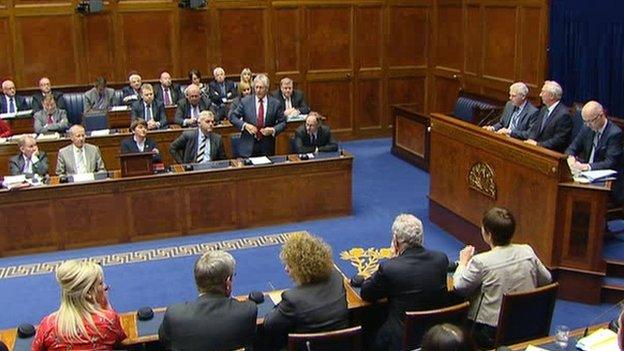Northern Ireland Assembly Speaker row: When is a deal not a deal?
- Published
- comments

MLAs failed to elect a new speaker to chair debates at the Northern Ireland Assembly on Monday, despite a deal made seven years ago between the DUP and Sinn Féin
Given the ramifications for the public of the deadlock at the Northern Ireland Assembly over budgets and welfare reform, the failure to elect a new assembly speaker may seem exclusively of concern to those inside the Belmont "beltway" (to borrow a phrase from US politics).
However, there must be a danger that the Democratic Unionist Party's decision to hold back on their very public commitment to replace Willie Hay with a Sinn Féin speaker, external will further debase the shaky currency at future Stormont negotiations.
When the parties convene on Thursday 16 October (assuming talks go ahead as envisaged by Northern Ireland Secretary Theresa Villiers) there will no doubt be recriminations over previous broken deals regarding the speaker, welfare reform and the Maze peace centre.
Welfare reform stand-off
The precedent set by last year's Haass talks is not encouraging. But say, for the sake of argument, the parties manage to broker an historic agreement this Christmas, then the question immediately arises, what is to stop one or other party going back on any pact in the New Year?
The prism through which First Minster Peter Robinson presented his tactic on Monday was that of the immediate stand-off over welfare reform. But it also true that if DUP MLAs hate anything more than having to co-operate with Sinn Féin, it is being seen to co-operate with Sinn Féin.
When the St Andrew's Agreement was hatched, one of the key changes that the DUP insisted upon was that the first and deputy first ministers should no longer be elected but instead appointed automatically on the basis of their party rankings. That way, DUP politicians would not have to troop into a lobby to elect Martin McGuinness, but could instead present his elevation as a fait accompli.
Automatic rotation
If the welfare stand-off is resolved, Peter Robinson said DUP and Sinn Féin MLAs could be voting to put the speaker deal back on track in a week or two. However, this presumes - as the DUP's Sammy Wilson put it on the Nolan show on Tuesday - that there is a continuing assembly for Sinn Féin's Mitchel McLaughlin to preside over.
One suspects that, as with the deputy first minister's appointment, many DUP MLAs would prefer it if a Sinn Féin speaker took the chair on an automatic rotation, rather than because they voted for a republican.